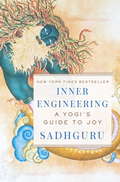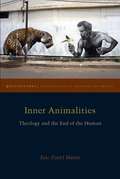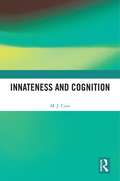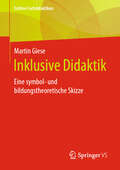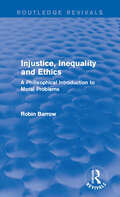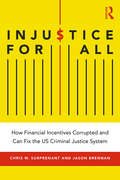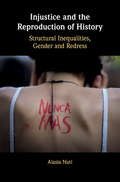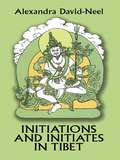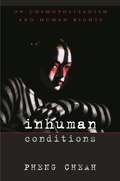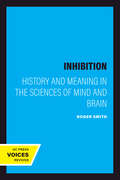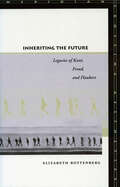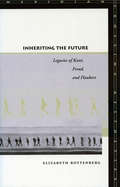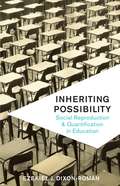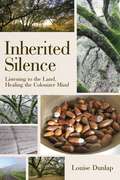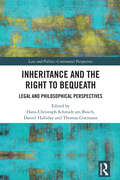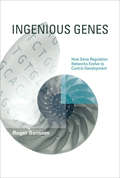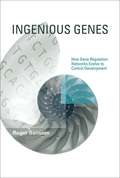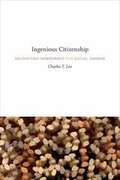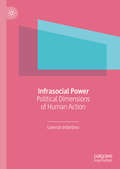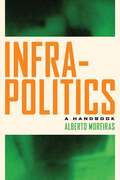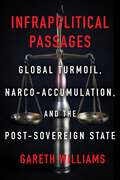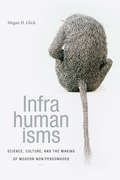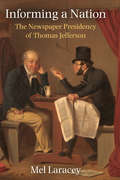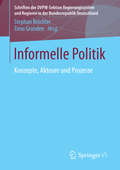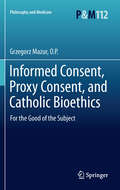- Table View
- List View
Inner Engineering: A Yogi's Guide to Joy
by SadhguruThought leader, visionary, philanthropist, mystic, and yogi Sadhguru presents Western readers with a time-tested path to achieving absolute well-being: the classical science of yoga.The practice of hatha yoga, as we commonly know it, is but one of eight branches of the body of knowledge that is yoga. In fact, yoga is a sophisticated system of self-empowerment that is capable of harnessing and activating inner energies in such a way that your body and mind function at their optimal capacity. It is a means to create inner situations exactly the way you want them, turning you into the architect of your own joy. A yogi lives life in this expansive state, and in this transformative book Sadhguru tells the story of his own awakening, from a boy with an unusual affinity for the natural world to a young daredevil who crossed the Indian continent on his motorcycle. He relates the moment of his enlightenment on a mountaintop in southern India, where time stood still and he emerged radically changed. Today, as the founder of Isha, an organization devoted to humanitarian causes, he lights the path for millions. The term guru, he notes, means "dispeller of darkness, someone who opens the door for you. . . . As a guru, I have no doctrine to teach, no philosophy to impart, no belief to propagate. And that is because the only solution for all the ills that plague humanity is self-transformation. Self-transformation means that nothing of the old remains. It is a dimensional shift in the way you perceive and experience life." The wisdom distilled in this accessible, profound, and engaging book offers readers time-tested tools that are fresh, alive, and radiantly new. Inner Engineering presents a revolutionary way of thinking about our agency and our humanity and the opportunity to achieve nothing less than a life of joy. Praise for Sadhguru and Inner Engineering "Contrarian and consistent, ancient and contemporary, Inner Engineering is a loving invitation to live our best lives and a profound reassurance of why and how we can."--Sir Ken Robinson, author of The Element, Finding Your Element, and Out of Our Minds: Learning to Be Creative "I am inspired by Sadhguru's capacity for joy, his exuberance for life, and the depth and breadth of his curiosity and knowledge. His book is filled with moments of wonder, awe, and intellectual challenge. I highly recommend it for anyone interested in self-transformation."--Mark Hyman, M.D., director, Cleveland Clinic Center for Functional Medicine, and New York Times bestselling author "Inner Engineering is a fascinating read of Sadhguru's insights and his teachings. If you are ready, it is a tool to help awaken your own inner intelligence, the ultimate and supreme genius that mirrors the wisdom of the cosmos."--Deepak ChopraFrom the Hardcover edition.
Inner Animalities: Theology and the End of the Human (Groundworks: Ecological Issues in Philosophy and Theology)
by Eric Daryl MeyerMost theology proceeds under the assumption that divine grace works on human beings at the points of our supposed uniqueness among earth’s creatures—our freedom, our self-awareness, our language, or our rationality. Inner Animalities turns this assumption on its head. Arguing that much theological anthropology contains a deeply anti-ecological impulse, the book draws creatively on historical and scriptural texts to imagine an account of human life centered in our creaturely commonality.The tendency to deny our own human animality leaves our self-understanding riven with contradictions, disavowals, and repressions. How are human relationships transformed when God draws us into communion through our instincts, our desires, and our bodily needs? Meyer argues that humanity’s exceptional status is not the result of divine endorsement, but a delusion of human sin. Where the work of God knits human beings back into creaturely connections, ecological degradation is no longer just a matter of bodily life and death, but a matter of ultimate significance.Bringing a theological perspective to the growing field of Critical Animal Studies, Inner Animalities puts Gregory of Nyssa and Karl Rahner in conversation with Jacques Derrida, Giorgio Agamben, Kelly Oliver, and Cary Wolfe. What results is not only a counterintuitive account of human life in relation with nonhuman neighbors, but also a new angle into ecological theology.
Innateness and Cognition
by M. J. CainThe question of innateness, or nativism, is one of the most heated problems in philosophy, reaching as far back as Plato but generating fierce debates in contemporary philosophy and cognitive science. Which aspects of the human mind are innate and which are the products of experience? Do we have any innate concepts or knowledge or are all the contents of the mind acquired by means of learning? Innateness and Cognition is a much-needed overview of this important problem. Through addressing the following topics M.J. Cain argues for a nativist perspective which, nevertheless, finds an important role for culture and social learning in cognitive development: the nature of innateness the coherence and explanatory value of the concept of innateness the acquisition of concepts and the role of learning in conceptual development domain specific knowledge, including the 'massive modularity' thesis and the theory of core knowledge domains cognitive development relating the theory of mind and mathematics the relationship between biological and cultural evolution and their respective roles in cognitive development language and innateness, particularly Chomsky's linguistic nativism and challenges to this morality, moral judgment, and innateness. Innateness and Cognition is an excellent resource for those researching and studying philosophy of psychology and philosophy of mind, as well as those interested in foundational issues in cognitive science, psychology, linguistics, and anthropology.
Inklusive Didaktik: Eine symbol- und bildungstheoretische Skizze (Edition Fachdidaktiken)
by Martin GieseMit diesem Buch legt der Autor den Entwurf einer symboltheoretischen und erfahrungsorientierten Fundierung des Inklusionsdiskurses sensu Cassirer vor. Vor dem Hintergrund der Annahme, dass sich der Inklusionsdiskurs sowohl in der Behindertenpädagogik als auch in der allgemeinen Erziehungswissenschaft durch ein explizites Theoriedefizit auszeichnet, verfolgt dieser Band das Ziel, eine inklusive schulische Didaktik besser als bisher theoretisch zu legitimieren.Der InhaltEinleitung • Zum Forschungsstand im Inklusionsdiskurs • Semiotische und bildungstheoretische Überlegungen – Eine kulturanthropologische Skizze • Didaktische Perspektiven • FazitDer AutorPD Dr. Martin Giese ist an der Deutschen Blindenstudienanstalt e.V. in Marburg sowie als Privatdozent am Institut für Rehabilitationswissenschaften der Humboldt-Universität zu Berlin tätig.
Injustice, Inequality and Ethics: A Philosophical Introduction to Moral Problems (Routledge Revivals)
by Robin BarrowAbortion, distribution of wealth, civil disobedience, reverse discrimination, sex-role stereotyping, censorship – what does philosophy have to contribute to these practical moral issues? In this important book, first published in 1982, Robin Barrow argues convincingly that the capacity to make fine conceptual discriminations is crucial to an informed response to such issues, and he alerts us to the degree to which this ability has been lacking in much previous philosophical thought. The author presents a series of formidable arguments regarding the more controversial social and moral issues of our time, and in doing so he gives the general reader and the student of philosophy a clearer appreciation of the nature of the philosophical contribution.
Injustice for All: America's Dysfunctional Criminal Justice System and How to Fix It
by Jason Brennan Chris W SurprenantAmerican criminal justice is a dysfunctional mess. Cops are too violent, the punishments are too punitive, and the so-called Land of the Free imprisons more people than any other country in the world. Understanding why means focusing on color—not only on black or white (which already has been studied extensively), but also on green. The problem is that nearly everyone involved in criminal justice—including district attorneys, elected judges, the police, voters, and politicians—faces bad incentives. Local towns often would rather send people to prison on someone else’s dime than pay for more effective policing themselves. Local police forces can enrich themselves by turning into warrior cops who steal from innocent civilians. Voters have very little incentive to understand the basic facts about crime or how to fix it—and vote accordingly. And politicians have every incentive to cater to voters’ worst biases. Injustice for All systematically diagnoses why and where American criminal justice goes wrong, and offers functional proposals for reform. By changing who pays for what, how people are appointed, how people are punished, and which things are criminalized, we can make the US a country which guarantees justice for all. Key Features: Shows how bad incentives, not "bad apples," cause the dysfunction in American criminal justice Focuses not only on overincarceration, but on overcriminalization and other failures of the criminal justice system Provides a philosophical and practical defense of reducing the scope of what’s considered criminal activity Crosses ideological lines, highlighting both the weaknesses and strengths of liberal, conservative, and libertarian agendas Fully integrates tools from philosophy and social science, making this stand out from the many philosophy books on punishment, on the one hand, and the solely empirical studies from sociology and criminal science, on the other Avoids disciplinary jargon, broadening the book’s suitability for students and researchers in many different fields and for an interested general readership Offers plausible reforms that realign specific incentives with the public good.
Injustice and the Reproduction of History: Structural Inequalities, Gender and Redress
by Alasia NutiDemands for redress of historical injustice are a crucial component of contemporary struggles for social and transnational justice. However, understanding when and why an unjust history matters for considerations of justice in the present is not straightforward. Alasia Nuti develops a normative framework to identify which historical injustices we should be concerned about, to conceptualise the relation between persistence and change and, thus, conceive of history as newly reproduced. Focusing on the condition of women in formally egalitarian societies, the book shows that history is important to theorise the injustice of gender inequalities and devise transformative remedies. Engaging with the activist politics of the unjust past, Nuti also demonstrates that the reproduction of an unjust history is dynamic, complex and unsettling. It generates both historical and contemporary responsibilities for redress and questions precisely those features of our order that we take for granted.
Initiations and Initiates in Tibet
by Alexandra David-NeelNestled amid the high peaks and eternal snows of the Himalayas and other mountain ranges, Tibet is home to a centuries-old Buddhist tradition, rich in mystic rites and rituals aimed at helping adherents achieve spiritual bliss. In this fascinating volume, a noted authority delves into the nature and sources of Tibetan mysticism, providing readers with a wealth of information regarding Lamaic rites of initiation and the teachings given to initiates, both during and after the initiation ceremonies.The author first defines Tibetan mysticism and examines the role of the spiritual guide and the choice of a master. This is followed by a discussion of the nature of the esoteric doctrines and traditional oral instruction. Madame David-Neel then recounts in detail the various kinds of initiations and their aims, including initiations with and without "activity," the "Mani" initiation, and the different meanings of Aum mani padme hum! Also covered are the magic rites known as dubthabs, the "gymnastics" of respiration, daily spiritual exercises, the contemplation of sun and sky, the dalai lamas, different kinds of morality, and many other topics.Alexandra David-Neel was a historian of religion and a resident of Tibet for 14 years. As a practicing Buddhist, she participated in many of the spiritual rites and practices described in this book, which gives her account a special immediacy and authenticity. Lucid, objective, and highly readable, Initiations and Initiates in Tibet is a treasury of fact and lore offering valuable insights and information to students of religion and Tibetan Buddhism in particular.
Inhuman Conditions: On Cosmopolitanism and Human Rights
by Pheng CheahGlobalization promises to bring people around the world together, to unite them as members of the human community. To such sanguine expectations, Pheng Cheah responds deftly with a sobering account of how the "inhuman" imperatives of capitalism and technology are transforming our understanding of humanity and its prerogatives. Through an examination of debates about cosmopolitanism and human rights, Inhuman Conditions questions key ideas about what it means to be human that underwrite our understanding of globalization. Cheah asks whether the contemporary international division of labor so irreparably compromises and mars global solidarities and our sense of human belonging that we must radically rethink cherished ideas about humankind as the bearer of dignity and freedom or culture as a power of transcendence. Cheah links influential arguments about the new cosmopolitanism drawn from the humanities, the social sciences, and cultural studies to a perceptive examination of the older cosmopolitanism of Kant and Marx, and juxtaposes them with proliferating formations of collective culture to reveal the flaws in claims about the imminent decline of the nation-state and the obsolescence of popular nationalism. Cheah also proposes a radical rethinking of the normative force of human rights in light of how Asian values challenge human rights universalism.
Inhibition: History and Meaning in the Sciences of Mind and Brain
by Roger SmithIn everyday parlance, "inhibition" suggests repression, tight control, the opposite of freedom. In medicine and psychotherapy the term is commonplace, its definition understood. Relating how inhibition—the word and the concept—became a bridge between society at large and the natural sciences of mind and brain, Smith constructs an engagingly original history of our view of ourselves.Not until the late nineteenth century did the term "inhibition" become common in English, connoting the dependency of reason and of civilization itself on the repression of "the beast within." This usage followed a century of Enlightenment thought about human nature and the nature of the human mind. Smith traces theories of inhibitory control from the moralistic psychologies of the early nineteenth century to the famous twentieth-century schools of Sherrington, Pavlov, and Freud. He finds that the meanings of "inhibition" cross disciplinary boundaries and outline the growth of our belief in the self-regulated person.
Inheriting the Future: Legacies of Kant, Freud, and Flaubert
by Elizabeth RottenbergThis book explores several canonical works of philosophy, psychoanalysis, and literature. The surprising juxtaposition of Kant's moral philosophy, Freud's reflections on obsessional neurosis, and Flaubert's peculiar late novel Bouvard et Pécuchet forms the basis of a compelling argument linking each of these central works around the problem of moral thought as it fundamentally determines the modern subject in relation to time. The book engages an area of emerging importance in contemporary critical thought, the problem of ethics or "otherness" as a crucial factor at play in speculative and literary works. The readings in this book provide insight into the ways in which three fundamental philosophical, psychoanalytic, and literary texts can be reread in light of their confrontation with a seemingly inhuman force at the heart of the foundation of the human subject.
Inheriting the Future
by Elizabeth RottenbergThis book explores several canonical works of philosophy, psychoanalysis, and literature. The surprising juxtaposition of Kant's moral philosophy, Freud's reflections on obsessional neurosis, and Flaubert's peculiar late novel Bouvard et Pécuchet forms the basis of a compelling argument linking each of these central works around the problem of moral thought as it fundamentally determines the modern subject in relation to time. The book engages an area of emerging importance in contemporary critical thought, the problem of ethics or "otherness" as a crucial factor at play in speculative and literary works. The readings in this book provide insight into the ways in which three fundamental philosophical, psychoanalytic, and literary texts can be reread in light of their confrontation with a seemingly inhuman force at the heart of the foundation of the human subject.
Inheriting Possibility: Social Reproduction and Quantification in Education
by Ezekiel J. Dixon-RománHow has the dominant social scientific paradigm limited our understanding of the impact of inherited economic resources, social privilege, and sociocultural practices on multigenerational inequality? In what ways might multiple forces of social difference haunt quantitative measurements of ability such as the SAT? Building on new materialist philosophy, Inheriting Possibility rethinks methods of quantification and theories of social reproduction in education, demonstrating that test performance results and parenting practices convey the impact of materially and historically contingent patterns of differential possibility.Ezekiel J. Dixon-Román explores the dualism of nature and culture that has undergirded theories of inheritance, social reproduction, and human learning and development. Research and debate on the reproduction of power relations have rested on a premise that nature is made up of fixed universals on which the creative, intellective, and discursive play of culture are based. Drawing on recent work in the physical and biological sciences, Dixon-Román argues that nature is culture. He contends that by assuming a rigid nature/culture binary, we ultimately limit our understanding of how power relations are reproduced. Through innovative analyses of empirical data and cultural artifacts, Dixon-Román boldly reconsiders how we conceptualize the processes of inheritance and approach social inquiry in order to profoundly sharpen understanding and address the reproducing forces of inequality.
Inherited Silence: Listening to the Land, Healing the Colonizer Mind
by Louise DunlapAn insightful look at the historical damages early colonizers of America caused and how their descendants may recognize and heal the harm done to the earth and the native peoplesInherited Silence tells the story of beloved land in California’s Napa Valley—how the land fared during the onslaught of colonization and how it fares now in the drought, development, and wildfires that are the consequences of the colonial mind. Author Louise Dunlap’s ancestors were among the first Europeans to claim ownership of traditional lands of the Wappo people during a period of genocide. As settlers, her ancestors lived the dream of Manifest Destiny, their consciousness changing only gradually over the generations.When Dunlap’s generation inherited the land, she had already begun to wonder about its unspoken story. What had kept her ancestors from seeing and telling the truth of their history? What had they brought west with them from the very earliest colonial experience in New England? Dunlap looks back into California’s and America’s history for the key to their silences and a way to heal the wounds of the land, its original people, and the harmful mind of the colonizer.It’s a powerful story that will awaken others to consider their own ancestors’ role in colonization and encourage them to begin reparations for the harmful actions of those who came before. More broadly, it offers a way for every reader to evaluate their own current life actions and the lasting impact they can have on society and our planet.
Inheritance and the Right to Bequeath: Legal and Philosophical Perspectives (Law and Politics)
by Thomas Gutmann Daniel Halliday Hans-Christoph Schmidt am BuschIn every Western democracy today, inheritances have a very profound influence on people’s lives. This motivates renewed scholarship on inheritance law by philosophy and the legal sciences. The present volume aims to contribute to some ongoing areas of inquiry while also filling some gaps in research. It is organized in a highly interdisciplinary way. In the thirteen chapters of the book, written by outstanding philosophers and legal scholars, the following questions, among others, are discussed: What is the nature of the right to bequeath? What are the social functions of bequest and inheritance? What arguments concerning justice have philosophers and legal scholars advanced in favour or against practices of bequest and inheritance? How should we think about taxing the wealth transfers that occur in bequest and inheritance? In discussing these questions, the authors break new ground and offer much needed insight into several related domains, such as the philosophy of law; legal theory; general and applied ethics; social and political philosophy; theories of justice; and the history of legal, political, and economic thought. This book will be of great interest to scholars in these areas as well as policy-makers.
Ingenious Genes: How Gene Regulation Networks Evolve to Control Development (Life and Mind: Philosophical Issues in Biology and Psychology)
by Roger SansomA proposal for a new model of the evolution of gene regulation networks and development that draws on work from artificial intelligence and philosophy of mind.Each of us is a collection of more than ten trillion cells, busy performing tasks crucial to our continued existence. Gene regulation networks, consisting of a subset of genes called transcription factors, control cellular activity, producing the right gene activities for the many situations that the multiplicity of cells in our bodies face. Genes working together make up a truly ingenious system. In this book, Roger Sansom investigates how gene regulation works and how such a refined but simple system evolved.Sansom describes in detail two frameworks for understanding gene regulation. The first, developed by the theoretical biologist Stuart Kauffman, holds that gene regulation networks are fundamentally systems that repeat patterns of gene expression. Sansom finds Kauffman's framework an inadequate explanation for how cells overcome the difficulty of development. Sansom proposes an alternative: the connectionist framework. Drawing on work from artificial intelligence and philosophy of mind, he argues that the key lies in how multiple transcription factors combine to regulate a single gene, acting in a way that is qualitatively consistent. This allows the expression of genes to be finely tuned to the variable microenvironments of cells. Because of the nature of both development and its evolution, we can gain insight into the developmental process when we identify gene regulation networks as the controllers of development. The ingenuity of genes is explained by how gene regulation networks evolve to control development.
Ingenious Genes
by Roger SansomEach of us is a collection of more than ten trillion cells, busy performing tasks crucial to our continued existence. Gene regulation networks, consisting of a subset of genes called transcription factors, control cellular activity, producing the right gene activities for the many situations that the multiplicity of cells in our bodies face. Genes working together make up a truly ingenious system. In this book, Roger Sansom investigates how gene regulation works and how such a refined but simple system evolved. Sansom describes in detail two frameworks for understanding gene regulation. The first, developed by the theoretical biologist Stuart Kauffman, holds that gene regulation networks are fundamentally systems that repeat patterns of gene expression. Sansom finds Kauffman's framework an inadequate explanation for how cells overcome the difficulty of development. Sansom proposes an alternative: the connectionist framework. Drawing on work from artificial intelligence and philosophy of mind, he argues that the key lies in how multiple transcription factors combine to regulate a single gene, acting in a way that is qualitatively consistent. This allows the expression of genes to be finely tuned to the variable microenvironments of cells. Because of the nature of both development and its evolution, we can gain insight into the developmental process when we identify gene regulation networks as the controllers of development. The ingenuity of genes is explained by how gene regulation networks evolve to control development.
Ingenious Citizenship: Recrafting Democracy for Social Change
by Charles T. LeeIn Ingenious Citizenship Charles T. Lee centers the daily experiences and actions of migrant domestic workers, sex workers, transgender people, and suicide bombers in his rethinking of mainstream models of social change. Bridging cultural and political theory with analyses of film, literature, and ethnographic sources, Lee shows how these abject populations find ingenious and improvisational ways to disrupt and appropriate practices of liberal citizenship. When voting and other forms of civic engagement are unavailable or ineffective, the subversive acts of a domestic worker breaking a dish or a prostitute using the strategies and language of an entrepreneur challenge the accepted norms of political action. Taken to the extreme, a young Palestinian woman blowing herself up in a Jerusalem supermarket questions two of liberal citizenship's most cherished values: life and liberty. Using these examples to critically reinterpret political agency, citizenship practices, and social transformation, Lee reveals the limits of organizing change around a human rights discourse. Moreover, his subjects offer crucial lessons in how to turn even the worst conditions and the most unstable positions in society into footholds for transformative and democratic agency.
Infrasocial Power: Political Dimensions of Human Action
by Lorenzo InfantinoBuilding from the level of individual interaction, this book intends to shed light on what the author terms "infrasocial power" and the relation between this individual-actor oriented level and public power. In overviewing the origins of power, the author allows for the disaggregation of the social fabric, thus making it possible to: 1) isolate the “sequence” in which the phenomenon of superordination and subordination materialises; 2) identify the institutional “instruments” which can be used to limit infrasocial power; 3) discriminate between a social position achieved through engagement with others (and what we are capable of doing for them) from one occupied by means of force and deception; 4) explain the birth and function of public power; and 5) analyze the consequences produced by different political regimes.
Infrapolitics: A Handbook
by Alberto MoreirasThe personal is not political, even if politics marks it and, in many cases, determines it. Infrapolitics seeks to understand conditions of existence that are not reducible to political life and that exceed any definition of world bound to political determinations. It seeks to mobilize an exteriority without which politics could only be business or administration, that is, oppression. It demands a change in seeing and an everyday practice that subtracts from political totalization in the name of a new production of desire, of a new emancipation, and of a conception of experience that can breach the general captivation of life.In this book, Alberto Moreiras describes a form of thought aiming to provide content for a form of life and to offer a new theoretical practice for concrete existence. The book provides a genealogy of the notion of infrapolitics and places it within contemporary philosophical reflection, examining its deployment in the wake of postphenomenology and deconstruction, Lacanian analysis, the principle of anarchy, and an egalitarian symbolization of social life. In doing so, Moreiras elaborates Infrapolitics as both a general critique of the political apparatus and as an imperative horizon for existential self-understanding.
Infrapolitical Passages: Global Turmoil, Narco-Accumulation, and the Post-Sovereign State
by Gareth WilliamsThis book makes a case for infrapolitics as an enactment of intellectual responsibility in the face of a tumultuous world of war and of technological value extraction on a planetary scale. Infrapolitical Passages proposes to clear a way through some of the dominant political determinations and violent symptoms of contemporary globalization. In doing so, Gareth Williams makes a case for infrapolitics as an enactment of intellectual responsibility in the face of a tumultuous world of war and of technological value extraction on a planetary scale. The book offers a theory of globalization as a gigantic, directionless crisis in humanity’s symbolic organization, as well as a theory of global economic warfare as the very positing of directionlessness and, at the same time, facticity. Williams’s infrapolitics stands at a distance from the biopolitical, which it understands as domination presenting itself as the production of specific forms of subjectivity in the face of the commodity. The subsequent obscuring of being signals the need to circumvent the instrumentalization of life as subordination to the metaphysics of subjectivity, representation, and politics. Infrapolitical Passages works to confront that which is unavailable in subjectivity and representation, opening a way for facticity in the age of globalization in order to make room for the infrapolitical question for existence.
Infrahumanisms: Science, Culture, and the Making of Modern Non/personhood (ANIMA: Critical Race Studies Otherwise)
by Megan H. GlickIn Infrahumanisms Megan H. Glick considers how conversations surrounding nonhuman life have impacted a broad range of attitudes toward forms of human difference such as race, sexuality, and health. <P><P>She examines the history of human and nonhuman subjectivity as told through twentieth-century scientific and cultural discourses that include pediatrics, primatology, eugenics, exobiology, and obesity research. Outlining how the category of the human is continuously redefined in relation to the infrahuman—a liminal position of speciation existing between the human and the nonhuman—Glick reads a number of phenomena, from early twentieth-century efforts to define children and higher order primates as liminally human and the postwar cultural fascination with extraterrestrial life to anxieties over AIDS, SARS, and other cross-species diseases. <P><P>In these cases the efforts to define a universal humanity create the means with which to reinforce notions of human difference and maintain human-nonhuman hierarchies. In foregrounding how evolving definitions of the human reflect shifting attitudes about social inequality, Glick shows how the consideration of nonhuman subjectivities demands a rethinking of long-held truths about biological meaning and difference.
Informing a Nation: The Newspaper Presidency of Thomas Jefferson
by Melvin LaraceyDuring his presidency, Thomas Jefferson both sponsored and wrote for his own newspaper, the National Intelligencer and Washington Advertiser. The newspaper spoke on behalf of his policies and those of his Republican, anti-federalist party, the Democratic-Republicans, the precursor to today’s Democrats. Author Mel Laracey focuses on the newspaper’s message during Jefferson’s first term, showing how the third president used media to promote his administration and its goals against their political rivals, the Federalists. Informing a Nation shows how Jefferson and his allies dealt with political challenges, reveals hitherto unexamined aspects of the early presidency, and raises broad questions of the relationship between the presidency and media today.
Informelle Politik
by Stephan Bröchler Timo Grunden,,Wirklich wichtige Entscheidungen werden ausnahmslos in Gremien getroffen, die es nicht gibt. " Walter Scheel wird gewusst haben, wovon er sprach. Die Verfassungswirklichkeit der Bundesrepublik Deutschland erschließt sich nicht allein durch das Staatsorganisationsrecht. Regieren ist auch ein Prozess, der in informelle Entscheidungszentren verlagert wird, der ungeschriebenen Regeln folgt und den beteiligten Akteuren ein politisches Praxiswissen abverlangt. Aus diesem Grund wird ,,informelles Regieren" immer mehr zu einem Schlüsselbegriff der Regierungsforschung. Die informellen Institutionen und politischen Praktiken des Regierens sind der Gegenstand dieses Bandes. Die Autorinnen und Autoren setzen sich kritisch mit Analysekonzepten zum ,,Informellen Regieren" auseinander und präsentieren neue empirische Erkenntnisse.
Informed Consent, Proxy Consent, and Catholic Bioethics
by Grzegorz Mazur, O.P.This work offers a comprehensive understanding rooted in Catholic anthropology and moral theory of the meaning and limits of informed and proxy consent to experimentation on human subjects. In particular, it seeks to articulate the rationale for proxy consent in both therapeutic and nontherapeutic settings. As to the former, the book proposes that the Golden Rule, recognizing the basic inclinations of human nature toward objective goods perfective of human persons, should underpin the notion of proxy consent to experimentation on humans. As to the latter, an additional scrutiny of the amount of risk involved is necessary, since the risk-benefit ratio frequently invoked to justify higher-risk therapeutic research does not exist in its nontherapeutic counterpart. This study discusses a number of possible solutions to this question and develops a position that builds upon the objective notion of the human good.
